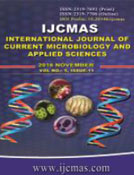


 National Academy of Agricultural Sciences (NAAS)
National Academy of Agricultural Sciences (NAAS)

|
PRINT ISSN : 2319-7692
Online ISSN : 2319-7706 Issues : 12 per year Publisher : Excellent Publishers Email : editorijcmas@gmail.com / submit@ijcmas.com Editor-in-chief: Dr.M.Prakash Index Copernicus ICV 2018: 95.39 NAAS RATING 2020: 5.38 |
Diarrhoea is a common gastrointestinal symptom in HIV positive patients occurring in more than 90% of the patients. It is also an independent indicator of mortality in these patients. The present study was conducted with objective to identify the prevalence of intestinal parasitic infections in HIV seropositive patients presenting with diarrhoea and to correlate with CD4 T cell counts. Stool samples from 100 HIV seropositive patients presenting with diarrhoea were collected and subjected to macroscopic examination, micrsoscopic examination and special staining techniques. Samples were also subjected to concentration technique. The CD4 cell counts of the patients were analyse during flow cytometry. (Becton and Dickinson, USA, FACS caliber). Statistical Analysis used: Percentages, Mean, Standard Deviation. Cryptosporidium parvum (66%) followed by Isospora belli (6%) was the commonest opportunistic coccidian parasite isolated from patients presenting with chronic diarrhoea, with CD4 counts < 200cells/μl. Among non opportunistic parasite E.histolytica (12%) was the most common. Parasitic infections were seen in 85% of patients. Coccidian parasites were more common with CD4 counts below <200 cells/µl. Among opportunistic parasite cryptosporidium parvum followed by isospora belli was common. E.histolytica was common among non opportunistic parasite. Regular monitoring of CD4 counts and screening for these opportunistic agents in the HIV infected will help clinicians for proper management and in turn helps in reducing the mortality and morbidity associated with infections by these agents.
 |
 |
 |
 |
 |